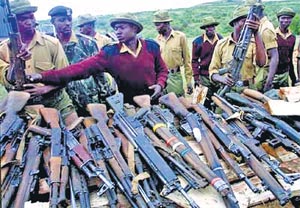
Small arms proliferation: It's big business and nobody's businessNEW YORK - Nicholas Cage, who plays the role of an unscrupulous arms wheeler-dealer in the 2005 Hollywood movie 'Lord of War', contemptuously dismisses military embargoes -- whether imposed by the United States or the United Nations -- as little or no hindrance to the world's illegal arms trade. "If I do my job right, an arms embargo should be practically impossible to enforce," he boasts to the leader of a rebel group seeking illicit arms (which could possibly be the LTTE). Since the LTTE is not subject either to a US or a UN arms embargo, it has fewer constraints buying weapons from rogue arms dealers or rogue nations. The longstanding motto of international arms dealers may well be: if you have the moolah, we have the bazooka.
A new UN study on the illicit trade in small arms, which cites Nicholas Cage, says his remarks are "a cynical but convincing illustration of the growing problem of illicit brokering in small arms and light weapons." The 26-page report, which will go before the upcoming session of the General Assembly beginning September 18, points out that illicit brokering, conducted through "intricate arrangements involving complex transportation routes and opaque financial transfers, has a profound destabilising effect, and have been an important factor in violations of arms embargoes imposed by the Security Council." Using false documents and bogus end-user certificates, arms dealers have been able to violate embargoes in several African countries, including Angola, Ivory Coast, the Democratic Republic of Congo, Liberia, Sierra Leone, Somalia and Sudan. The violations have been attributed to an international network of middlemen involved in the illicit brokering of small arms. By mid-2007, about 40 countries had enacted national laws, regulations and procedures against arms brokering. Still, it is far cry from the entire UN membership, which comprises 192 countries. As a result, the loopholes in most national laws are big enough to fly through a jumbo jet with a massive load of AK-47s, one of the most heavily used automatic weapons in insurgencies throughout the world. When Mikhail Kalashnikov, the Russian creator of the AK-47 (Avtomat Kalashnikov, first produced in 1947) was asked whether he has had sleepless nights having nightmares about the hundreds and thousands of people killed with his destructive weapon, he said: "I sleep fine. It is politicians that are to blame, because they fail to come to agreements and instead resolve their problems with violence." Weapons of mass destruction Daniel Prins, chairperson of the group of inter-governmental experts authoring the UN report, says research has shown that arms brokers pay a critical role in the illicit trade of small arms and the widespread availability of these weapons. Since small arms are considered the weapons of choice in most insurgencies and low-intensity military conflicts worldwide, they have been described as "the real weapons of mass destruction"-- not chemical, biological or nuclear weapons. The UN points out that small arms -- including assault rifles, grenade launchers and sub-machine guns -- are primarily responsible for much of the death and destruction in conflicts throughout the world. Currently, there are more than 600 million small arms and light weapons in circulation worldwide, according to UN estimates. And small arms were instrumental in the deaths of over half a million people -- 10,000 per week, on average. But despite the availability of millions of small arms in open and underground markets, there is no international treaty to control the reckless proliferation of these light weapons worldwide. "Dinosaur bones and old postage stamps", yes, but a treaty on small arms, no," says Sarah Margon, director of Oxfam. "No one but a criminal would knowingly sell a gun to a murderer, yet governments can sell weapons to regimes with a history of human rights violations or to countries where weapons will go to war criminals," she points out. Ambassador Prasad Kariyawasam of Sri Lanka, who presided over the 2006 UN conference on small arms, says setting up an arms embargo would address only part of the problem because it leaves some of root causes untouched. "Arms embargoes mostly address the demand side but not the supply side," he added. As in the case of the drug trade, where international action is primarily on supply side, Kariyawasam said there should be a greater focus on supply side of the illicit trade of small arms and light weapons. "We need to address both supply and demand side equally to curb illegal small arms proliferation," he argued. At the same time, he pointed out that there are problems with the legitimate purchase of small arms. At the UN, several years ago in 2001, member states agreed on a global Programme of Action (POA) for this purpose. However, implementation of most objectives of the POA, as well as several other unresolved issues like civilian possession and how to combat the involvement of non-state actors in this illegal trade, remain as unfinished business, he added. Asked about the situation in Sri Lanka, he said: "Sri Lanka is committed to all efforts to stop illegal supply and illicit trade in small arms and light weapons. In fact, this abominable phenomenon has adversely affected Sri Lanka and its peace loving people for long years now." But that's another story. |
|| Front
Page | News | Editorial | Columns | Sports | Plus | Financial
Times | International | Mirror | TV
Times | Funday
Times || |
| |
Copyright
2007 Wijeya
Newspapers Ltd.Colombo. Sri Lanka. |
